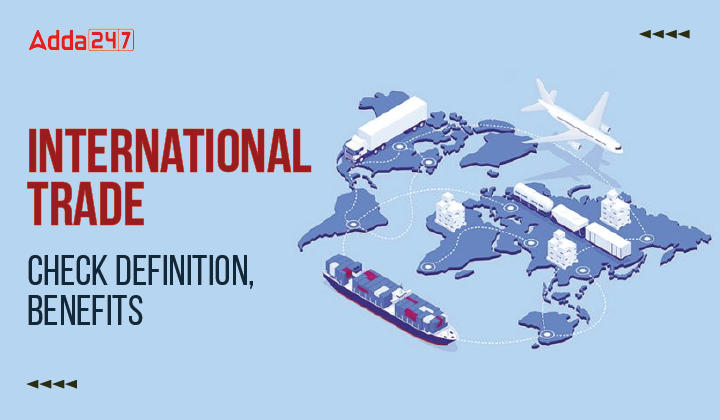Table of Contents
The world today has become a global village and trade is a renowned phenomenon in this global economy. The term trade refers to the exchange of goods and services. This exchange of goods and services can take place between the people living within a country or it can take place across the countries.
According trade can be ‘internal or domestic trade’ or ‘international trade. In this article, the reader will get a detailed view of meaning, factors determining international trade, differences between international and internal trade along with suggestions to improve international trade.
UGC NET Commerce Notes PDF & Study Materials.
International Trade Meaning
International trade refers to the exchange of goods and services between two or more two countries. This is a wider phenomenon as compared to domestic trade which is merely concerned with trade within the national boundaries of the country. International trade has been defined as follows:
- In the words of Anatol Murad, “International trade is trade between nations.”
- According to Penguin Dictionary. The exchange of goods and services between one country and another is called international trade.”
As far as the production of goods and services is concerned, all countries are not sufficient in themselves. It is so because different countries are differently endowed with resources, It may be natural resources, man-made resources or human resources Generally, while a country has an abundance of some resource(s), it suffers the scarcity of some others.
For example, Gulf countries are endowed with huge petroleum oil resources but have a scarcity of industrial goods. In such situations, trade across boundaries helps to exchange your surplus goods with those countries which do not have such goods. Thus, international trade implies exchanging good and services in consideration of money between the residents of one country and the other.
Determinants of International Trade
International trade is not affected by a single factor. There are multiple determinants requiring the need for international trade in the current scenario. These are as follows:
(1) International Specialisation: One of the main causes of international trade is international specialisation. It means that different countries of the world specialise in the production of those goods in whose production they possess special resources. The following factors affect international specialisation:
- Natural Endowment: Natural endowment is the basis of international specialisation. It refers to the resource base of a country, available to it as a free gift of nature. Oil wells in Gulf countries and huge deposits of mica in India are some of the typical examples of different natural endowments across different countries in the world.
- Technical Know-how: Technologically advanced nations of the world have overcome all constraints of natural endowment Japan is just a coastal country with a negligible natural resource base. But its technological superiority has earned it the distinction of the most advanced nation in the field of automobile manufacturing. So, it has technology as a speciality factor.
- Cost Difference: The difference in the cost of production is the fundamental basis of international specialisation. Different countries specialise in the production of those goods in which they have an absolute or comparative cost advantage.
- Marketing Factors: The art of salesmanship, product differentiation, advertisement and publicity are emerging to be some of the important factors in the present age of international consumerism. Business units of some countries have very popular brands. These brands are in great demand in other nations also. It becomes the basis of international trade.
(2) Non-availability of a Specific Factor: Every country is not in possession of all kinds of resources. Some factors may be available in some countries while other countries may be in possession of other factors. For instance, England does not produce tea and Japan has no iron mines. They have to import these goods. Likewise, India imports tin, as the same is not available here.
(3) Desire to Consume a Variety of Goods: Many a time, a country does import a commodity that it can produce itself. For instance, India produces cloth on a large scale and also exports it, nevertheless, India imports different varieties of cloth. It is done to enable people to consume large varieties of goods.
Difference between Internal Trade and International Trade
A comparison between internal (domestic) trade and international trade can be made by analysing the differences between the two. Generally, domestic trade takes place within a country from state to state or place to place to meet the needs of the people. In other words, differences in demand and supply, cost and prices among states or different places give rise to the exchange of goods and services internationally. This can be a cause of international trade also. The differences between domestic and international trade are given below:
| Basis of difference | Internal trade | International trade |
|---|---|---|
| Immobility of factors of production | Classical economists are of the view that the factors of production like labour and capital are mobile within the national boundaries of a country. | In international trade, mostly the factors of production are immobile and are reluctant to go to the other nation. |
| Different Market Conditions | In domestic trade, there is no such uncertainty in respect of market conditions. | In international trade, in addition to the geographical distances between the buyers and sellers, there are several difficulties due to differences in market conditions, such as, differences in customs, tastes, traditions, weigh and measles, terms of trade, etc. |
| Different Currencies | The internal trade is free from any currency problems. Since the currency involved here is the same and never changing | In international trade, there are problems in determining and then maintaining the exchange rates of different currencies. |
| Different Production Conditions | In the case of internal trade, there is not much difference in the country’s internal production conditions. These are usually the same. | The difference in production conditions in the two countries is quite natural. Every country has different technology, different taxation system, different labour laws, different social customs and different production facilities, etc. |
| Import and Export Restrictions | No restrictions are ordinarily imposed on the sale and purchase of goods in different parts of the country. | In the interest of national development and security governments of different countries do impose some restrictions on the import and export of some goods. |
| Mobility of goods | Means of transport such as railways, roads, airways and waterways can be easily used to transport goods from one place to the other in the same country. | In the case of international trade, airways and waterways are mostly used to transport goods from one country to the other. |
Suggestions to Overcome International Trade/Business
International trade plays an important role in global economic development. Since no country is self-sufficient these days, they need to be interdependent on each other to fulfil their needs for resources. Following are the suggestions to improve international trade practices:
- Use of modern technology.
- Promoting mutual trade among developing countries
- Developing import substitutes in the domestic economy of developing nations
- Diversification of exports.
- Strong regional trade organisations of developing nations.
- Control over domestic inflation.
- Population control in developing nations so as to generate more surplus for exports.
- Strong marketing efforts by governments of developing nations to publicise domestic products in global markets.




 UGC NET Study Notes for Paper 1, Downloa...
UGC NET Study Notes for Paper 1, Downloa...
 समुद्र का पर्य�...
समुद्र का पर्य�...
 उपमा अलंकार: पर�...
उपमा अलंकार: पर�...














